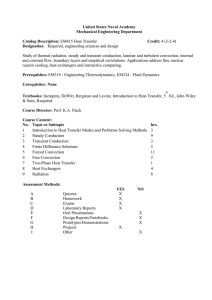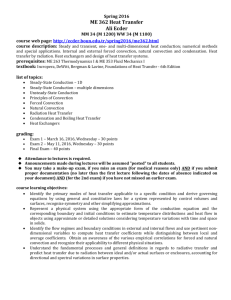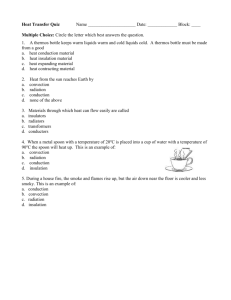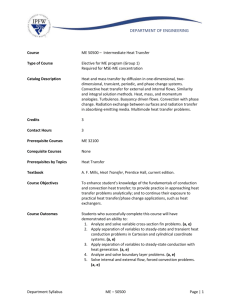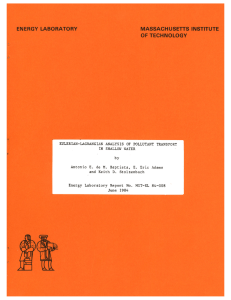me-407 heat transfer - Department of Chemical, Biological and
advertisement
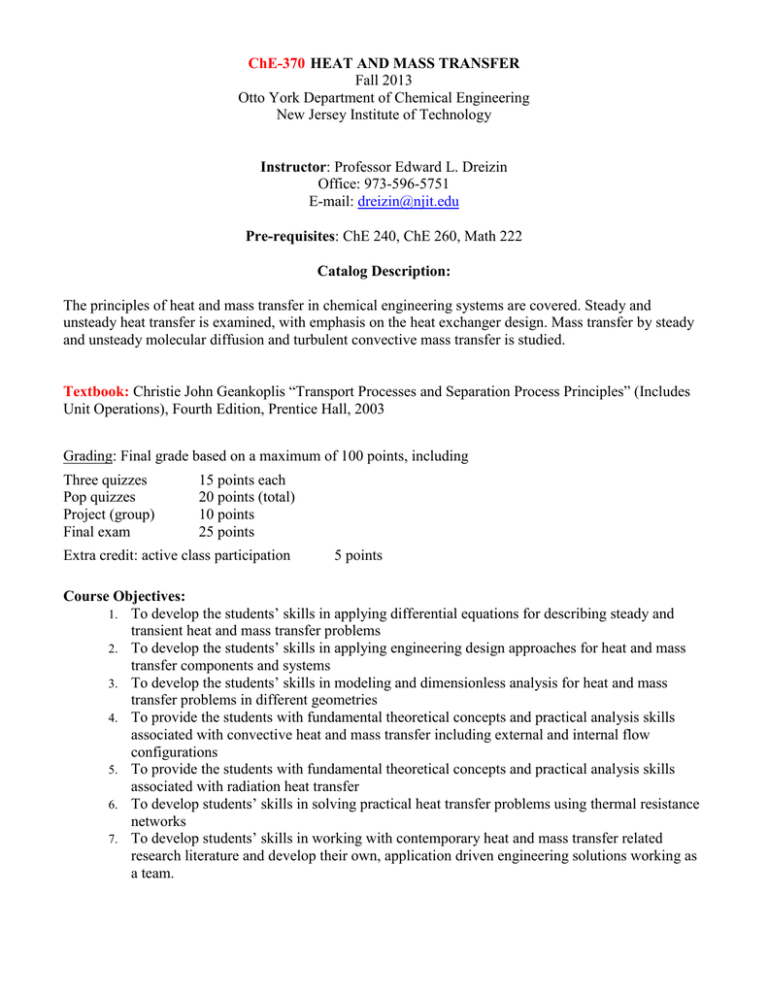
ChE-370 HEAT AND MASS TRANSFER Fall 2013 Otto York Department of Chemical Engineering New Jersey Institute of Technology Instructor: Professor Edward L. Dreizin Office: 973-596-5751 E-mail: dreizin@njit.edu Pre-requisites: ChE 240, ChE 260, Math 222 Catalog Description: The principles of heat and mass transfer in chemical engineering systems are covered. Steady and unsteady heat transfer is examined, with emphasis on the heat exchanger design. Mass transfer by steady and unsteady molecular diffusion and turbulent convective mass transfer is studied. Textbook: Christie John Geankoplis “Transport Processes and Separation Process Principles” (Includes Unit Operations), Fourth Edition, Prentice Hall, 2003 Grading: Final grade based on a maximum of 100 points, including Three quizzes Pop quizzes Project (group) Final exam 15 points each 20 points (total) 10 points 25 points Extra credit: active class participation 5 points Course Objectives: 1. To develop the students’ skills in applying differential equations for describing steady and transient heat and mass transfer problems 2. To develop the students’ skills in applying engineering design approaches for heat and mass transfer components and systems 3. To develop the students’ skills in modeling and dimensionless analysis for heat and mass transfer problems in different geometries 4. To provide the students with fundamental theoretical concepts and practical analysis skills associated with convective heat and mass transfer including external and internal flow configurations 5. To provide the students with fundamental theoretical concepts and practical analysis skills associated with radiation heat transfer 6. To develop students’ skills in solving practical heat transfer problems using thermal resistance networks 7. To develop students’ skills in working with contemporary heat and mass transfer related research literature and develop their own, application driven engineering solutions working as a team. Topics: 1. 2. 3. 4. 5. 6. 7. 8. 9. 10. 11. 12. 13. 14. 15. 16. 17. 18. 19. 20. 21. 22. 23. 24. 25. 26. 27. Review of syllabus, schedule, requirements; Introduction Fourier’s Law of thermal conductivity Steady conduction: flat slab, combined convection, conduction, radiation; overall coefficients Conduction: composite walls, materials in parallel Conduction through cylinder, sphere Unsteady heat conduction 1 Unsteady heat conduction 2 Quiz 1 (Conduction) Forced convection (external) Forced convection (internal), LMTD Forced convection outside various geometries; Introduction of Project Assignment Natural convection heat transfer (external flow) Natural convection heat transfer (internal flow) Heat exchangers Shell and tube heat exchangers, fouling factors Radiation heat transfer I Radiation heat transfer II Heat transfer in agitated vessels, Scraped-surface heat exchangers Quiz 2 (Convection, radiation) Introduction to mass transfer Molecular diffusion in gases Molecular diffusion in liquids Unsteady-state diffusion, diffusion in solids Analogy with heat transfer, convective mass transfer coefficient Quiz 3 (mass transfer) Project presentation/reports due Final Evaluation Method: 1. Quizzes: 15% each; total of 3 2. Pop-quizzes: 20 % all 3. Project: 10 % 4. Final exam: 25% Schedule: Lecture Recitation: 4 hours, per week
![Applied Heat Transfer [Opens in New Window]](http://s3.studylib.net/store/data/008526779_1-b12564ed87263f3384d65f395321d919-300x300.png)
